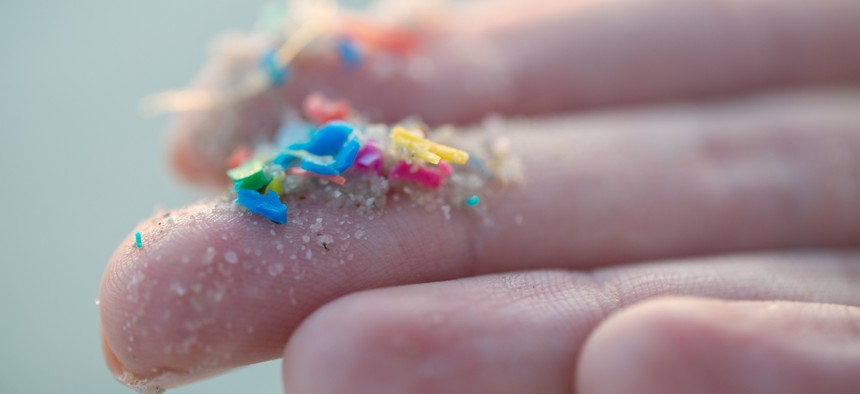AGs Urge Action on Households' Invisible Plastic Waste

Alistair Berg via Getty Images
In a letter, 17 Democratic state attorneys general called on the federal government to address "microfibers," the tiny bits of plastic most clothing sheds in washing machines.
For many, plastic pollution conjures images of sea critters tangled up in plastic soda rings or single-use bags tumbling down sidewalks. But in a letter this week, 17 Democratic state attorneys general, including Washington, D.C., urged the federal government to address a more insidious kind of pollution coming from a surprising source: laundry.
Most clothing today is made from plastic-based fabrics, including polyester, rayon and nylon. When those clothes are thrown in the wash, they shed tiny pieces of plastic called microfibers that end up in waterways. Microfibers are the most common kind of microplastics—defined as plastic that is smaller than 5 millimeters or the size of a pencil-top eraser—which are believed to harm people, animals and the environment. These minuscule flakes are found in food, drinking water and bloodstreams, and some research has shown they can have negative health impacts on animals, the attorneys’ general letter notes.
In general, however, little is known about the health impacts of human exposure to microplastics, according to the Environmental Protection Agency, and additional research is needed to understand the risks microfiber pollution poses.
Driving, in part, this push by Democratic AGs is the larger issue of plastic pollution. An estimated 11 million tons of plastic ends up in the ocean each year, according to Surfrider Foundation. Plastic bags, straws, food containers and bottles are among the largest culprits, and sea animals often ingest these materials. For instance, sea turtles have mistaken plastic bags for jellyfish—about half of sea turtles globally have eaten plastic. A turtle that eats just one piece of plastic has a 22% chance of dying, one study found.
The letter—addressed to administrators Michael Regan and Richard Spinrad of the Environmental Protection Agency and National Oceanic and Atmospheric Administration, respectively—urges the agencies to encourage state and industry leaders to develop and implement filtration systems in washing machines that can catch the strands of microplastics.
A single load of laundry is estimated to cast off up to 1.5 million microfibers. Some machines already have filters that catch a large share of those fibers before they are dumped into a wastewater system, but those devices are still uncommon among most machines and approximately 823 million tons of microfibers pass into the environment each year in the United States and Canada.
“Simple technology exists and is already required overseas to trap these plastics before they enter our waterways and ultimately our bodies,” said Connecticut Attorney General William Tong in a statement. “The United States is lagging where we should be leading globally on this emerging global threat.”
Some states are already looking to forge paths to reduce microfiber pollution. Backed by dozens of environmental groups and scientists, a bill introduced in California would require all new washing machines sold in the state to be fitted with microfiber filters by 2029. A similar initiative in Oregon aims to be operational by 2026. In 2018, the Connecticut General Assembly established a working group of industry and environmental stakeholders to improve consumer awareness of microfiber pollution and to recommend actions to address the issue.
The attorneys general also urged federal agencies to explore how authorities under the Clean Water Act can address microfiber pollution and to support further research on the issue. Any research should be conducted through the lens of environmental justice as not all communities are equally impacted by microplastic pollution, the letter notes.
The letter was signed by the attorneys general of Connecticut, California, Delaware, Washington, D.C., Illinois, Maryland, Michigan, Minnesota, Nevada, New York, Oregon, Pennsylvania, Rhode Island, Vermont, Washington, and Wisconsin.
Molly Bolan is the assistant editor for Route Fifty.
NEXT STORY: State Efforts to Undercut Local Governance Widen in Scope






